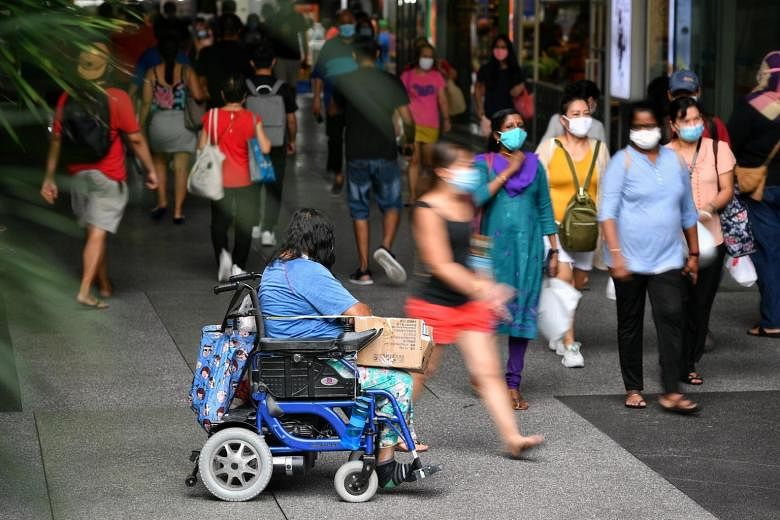SINGAPORE - Despite the progress made in the last 20 years for persons with disabilities, more needs to be done to plug gaps in areas like healthcare and jobs, said Ms Denise Phua (Jalan Besar GRC).
Speaking in Parliament on Wednesday (Oct 14), Ms Phua said Singapore has made major strides over the years in addressing the needs of people with disabilities (PWD). For instance, government funding for early intervention centres and special schools has increased substantially, and there are schemes to give incentives to employers to hire disabled people.
In 2013, the Government also set up SG Enable, an agency for the disability community, she added.
However, there is still not enough community awareness and support for persons with disabilities, and they still face social stigma, said Ms Phua.
Caregivers continue to worry about what will happen to their children or family members with disabilities after they die, she added. There is also a lack of a robust caregiver support model that is more empowering, family-based and community-based, she said.
Options for people with disabilities after they graduate from special education (Sped) schools are limited, she added.
Speaking during an adjournment motion - which allows an MP to speak on a subject for 20 minutes at the end of the sitting - Ms Phua said there are about 250,000 people with disabilities in Singapore, according to 2018 statistics.
If each disabled person has an average of three immediate family members, there are more than one million people directly impacted by disability in Singapore, she added.
As for education, Ms Phua said the "cliff effect phenomenon" for Sped students is well known. It refers to how services for Sped students drops to little or nothing after they complete formal schooling when they are about 18. And most SkillsFuture offerings are not accessible to adults with disabilities as there is no disability learning support, she added.
Turning to jobs, Ms Phua said people with disabilities have limited options for work, and there are not enough employers with the confidence to employ and develop them.
To address such issues, there are five key areas where more needs to be done for persons with disabilities, said Ms Phua.
First, the way society sees a person with disabilities must change - not as a patient with an illness to be cured or someone who needs charity, pity and is a victim of life. Instead, disabilities need to be seen as a result of attitudinal, environmental and social barriers - and removing these barriers will allow a disabled person to participate fully in community life.
Second, gaps in provisions for those with disabilities have to be addressed. Ms Phua suggested, among other things, developing a playbook to help them plan for life after a caregiver's death so that their quality of life is not affected.
Third, there needs to be a commitment to public reporting of performance and progress of these efforts.
Fourth, Ms Phua said there needs to be more structure in policymaking and implementing services for persons with disabilities, so "resources can be allocated from a 'life-cycle' perspective, knowing that each move make will impact the rest of the whole eco-system".
Lastly, persons with disabilities must be included in policymaking and implementation.
Govt stepping up efforts
In response, Minister of State for Social and Family Development and Education Sun Xueling said efforts to address the issues faced by people with disabilities are ongoing. These include strengthening support in the transition to post-schooling life and employment.
There are now transition planning coordinators in all Sped schools, and the Education Ministry will soon provide an individual planning guide to help develop person-centred plans for each student's school journey and transition to adult life, said Ms Sun.
SkillsFuture Singapore has also been working with training providers to offer courses for disabled people, and will be expanding the range of industry-relevant courses, she added.
For the insurance sector, the Social and Family Development Ministry and Monetary Authority of Singapore are looking to issue guidelines for insurers to treat people with disabilities like everyone else, unless such differences can be justified, said Ms Sun.
Existing schemes such as the wage offset Enabling Employment Credit and Open Door Programme that provides job placement support are meant to encourage more employers to hire people with disabilities, she added. "Much has been done to improve support for PWDs and caregivers, but definitely more can be done," said Ms Sun.
"As Ms Phua has noted, PWDs in the post-schooling years need more learning opportunities, customised services, and supportive work environments, closer to their homes. We will work with partners to co-create and pilot solutions."
Ms Sun added that PWDs and caregivers will be invited to participate in engagement sessions as part of the Emerging Stronger conversations, to talk about the challenges and opportunities arising from Covid-19.


